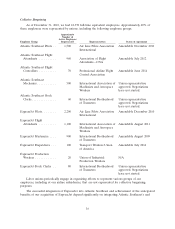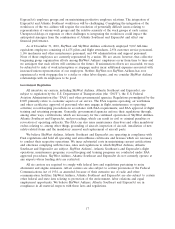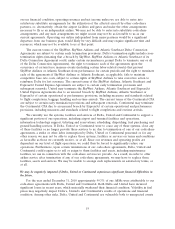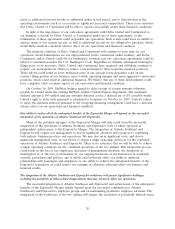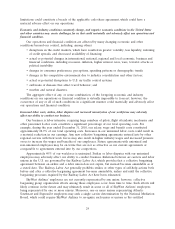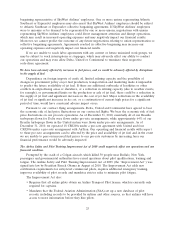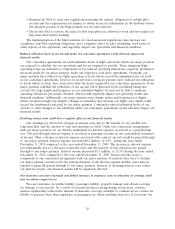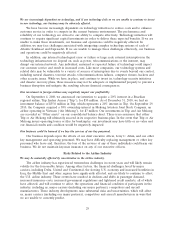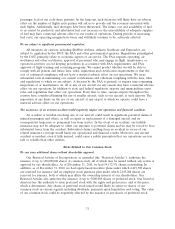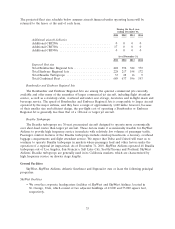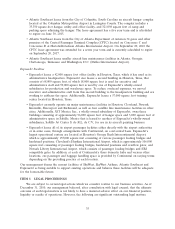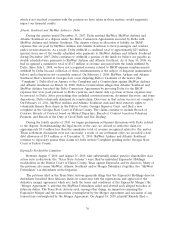SkyWest Airlines 2010 Annual Report Download - page 30
Download and view the complete annual report
Please find page 30 of the 2010 SkyWest Airlines annual report below. You can navigate through the pages in the report by either clicking on the pages listed below, or by using the keyword search tool below to find specific information within the annual report.• Requires the FAA to issue new regulations governing the airlines’ obligations to submit pilot
records and the requirements for airlines to obtain access for information in the database before
the database portion of the Improvement Act becomes effective.
• Directs the FAA to rewrite the rules for how long pilots are allowed to work and how much rest
they must have before working.
The implementation of the Improvements Act (and associated regulations) may increase our
compliance and FAA reporting obligations, have a negative effect on pilot scheduling, work hours or
other aspects of our operations, and negatively impact our operations and financial condition.
Reduced utilization levels of our aircraft under our code-share agreements would adversely impact our
financial results.
Our code-share agreements set forth minimum levels of flight operations which our major partners
are required to schedule for our operations and we are required to provide. These minimum flight
operating levels are intended to compensate us for reduced operating efficiencies caused by production
decreases made by our major partners under our respective code-share agreements. Generally, our
major partners have utilized our flight operations at levels which exceed the minimum levels set forth
in our code-share agreements, however, in recent years our major partners have reduced our utilization
to levels which, at times, have been lower than the levels required by our code-share agreements. If our
major partners schedule the utilization of our aircraft below historical levels (including taking into
account the stage length and frequency of our scheduled flights), we may not be able to maintain
operating efficiencies previously obtained, which would negatively impact our operating results and
financial condition. Additionally, our major partners may change routes and frequencies of flights,
which can shorten flight trip lengths. Changes in schedules may increase our flight costs, which could
exceed the reimbursed rates paid by our major partners. Continued reduced utilization levels of our
aircraft or other changes to our schedules under our code-share agreements would adversely impact our
financial results.
Declining interest rates could have a negative effect on our financial results.
Our earnings are affected by changes in interest rates due to the amount of our variable rate
long-term debt and the amount of cash and securities we hold. Under our contractual arrangements
with our major partners, we are directly reimbursed for interest expense on aircraft as a pass-through
cost. The pass-through interest expense is recorded as passenger revenue in our consolidated statement
of income. Thus, a decline in interest expense associated with contract aircraft would be passed through
to our major partners. Interest expense increased $0.2 million, or 0.2%, during the year ended
December 31, 2010 compared to the year ended December 31, 2009. The increase in interest expense
was substantially due to a decrease in interest rates and the majority of this reduction was passed
through to our major partners. Interest income increased $3.3 million, or 29.3% during the year ended
December 31, 2010, compared to the year ended December 31, 2009. Interest income is not a
component of our contractual arrangement with our major partners. If interest rates were to decline,
our major partners would receive the principal benefit of the interest expense decline, since interest
expense is generally passed through to our major partners, however, if declining interest rates reduce
our interest income, our financial results will be negatively affected.
Our insurance costs have increased and further increases in insurance costs or reductions in coverage could
have an adverse impact on us.
We carry insurance for public liability, passenger liability, property damage and all-risk coverage
for damage to our aircraft. As a result of terrorist attacks occurring during recent years, aviation
insurers significantly reduced the amount of insurance coverage available to commercial air carriers for
liability to persons other than employees or passengers for claims resulting from acts of terrorism, war
26


